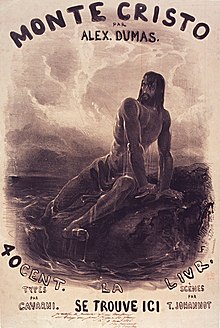
Back الكونت دي مونت كريستو Arabic Qraf Monte Kristo Azerbaijani Граф Монтэ-Крыста Byelorussian Граф Монте Кристо Bulgarian দ্য কাউন্ট অব মন্টি ক্রিস্টো Bengali/Bangla Le Comte de Monte-Cristo Breton El comte de Montecristo Catalan Hrabě Monte Cristo Czech Greven af Monte Cristo Danish Der Graf von Monte Christo German
 | |
| Author | Alexandre Dumas in collaboration with Auguste Maquet |
|---|---|
| Original title | Le Comte de Monte-Cristo |
| Language | French |
| Genre | Historical novel Adventure |
Publication date | 1844–1846 (serialized) |
| Publication place | France |
Original text | Le Comte de Monte-Cristo at French Wikisource |
| Translation | The Count of Monte Cristo at Wikisource |
The Count of Monte Cristo (French: Le Comte de Monte-Cristo) is an adventure novel by the French author Alexandre Dumas (père) serialized from 1844 to 1846. It is one of the author's most popular works, along with The Three Musketeers. Like many of his novels, it was expanded from plot outlines suggested by his collaborating ghostwriter, Auguste Maquet.[1]
The story takes place in France, Italy, and islands in the Mediterranean during the historical events of 1815–1839: the era of the Bourbon Restoration through the reign of Louis-Philippe of France. It begins on the day that Napoleon left his first island of exile, Elba, beginning the Hundred Days period of his return to power. The historical setting is a fundamental element of the book, an adventure story centrally concerned with themes of hope, justice, vengeance, mercy, and forgiveness.
Before he can marry his fiancée Mercédès, Edmond Dantès, a French nineteen-year-old first mate of the merchant ship Pharaon, is falsely accused of treason, arrested, and imprisoned without trial in the Château d'If, a grim island fortress off Marseille. A fellow prisoner, Abbé Faria, correctly deduces that romantic rival Fernand Mondego, envious crewmate Danglars, and double-dealing magistrate De Villefort are responsible for his imprisonment. Over the course of their long imprisonment, Faria educates Dantès and, knowing himself close to death, inspires him to retrieve for himself a cache of treasure Faria had discovered. After Faria dies, Dantès escapes and finds the treasure. As the fabulously wealthy, powerful and mysterious Count of Monte Cristo, he enters the fashionable Parisian world of the 1830s to avenge himself.
The book is widely considered a literary classic today.
- ^ Schopp, Claude (1988). Alexandre Dumas, Genius of Life. trans. by A. J. Koch. New York, Toronto: Franklin Watts. p. 325. ISBN 0-531-15093-3.